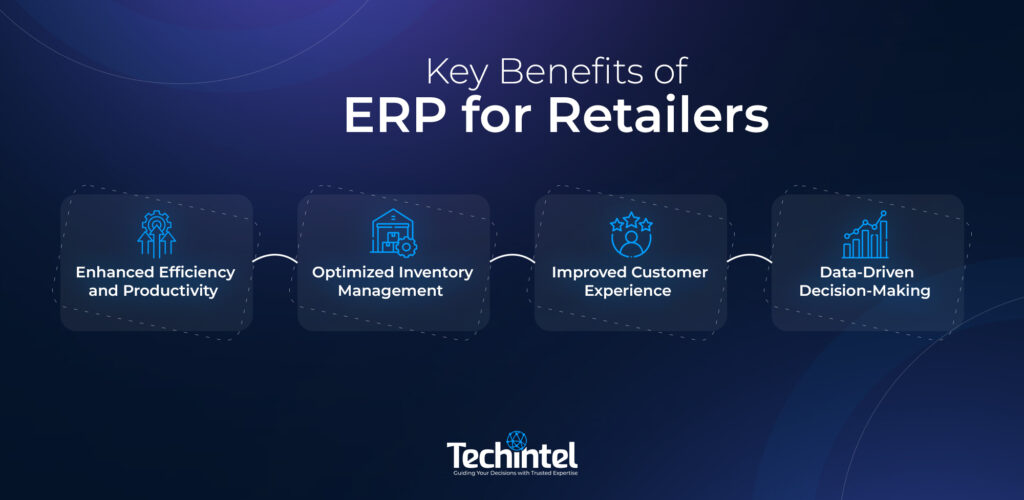In today’s rapidly evolving retail landscape, staying competitive requires more than just offering the right products. It demands streamlined operations, data-driven decision-making, and exceptional customer experiences. Enterprise Resource Planning (ERP) systems have emerged as a game-changer for retailers, offering a centralized platform to manage various aspects of their business, from inventory and supply chain to customer relationships and financials. Let’s explore how ERP is transforming retail operations.
Key Benefits of ERP for Retailers
- Enhanced Efficiency and Productivity: ERP systems automate processes, reduce manual data entry, and streamline workflows, leading to significant improvements in efficiency and productivity. By centralizing data and providing real-time visibility into operations, ERP enables retailers to optimize resource allocation, minimize errors, and improve decision-making. For instance, 66% of organizations report that ERP systems have improved their operational efficiency.
- Optimized Inventory Management: Accurate inventory tracking, demand forecasting, and supply chain optimization are critical for retailers. ERP systems provide real-time insights into inventory levels, allowing retailers to minimize stock outs, reduce excess inventory, and improve order fulfillment. Optimized inventory levels are the most common benefit realized for nearly 91% of companies using ERP.
- Improved Customer Experience: In today’s competitive market, customer experience is paramount. ERP systems enable retailers to personalize marketing campaigns, provide targeted sales promotions, and offer seamless omnichannel experiences. By integrating customer data from various touchpoints, ERP provides a 360-degree view of the customer, enabling retailers to enhance customer service, increase customer loyalty, and drive sales.
- Data-Driven Decision-Making: ERP systems consolidate data from across the organization, providing retailers with a unified data hub for business intelligence and analytics. With real-time access to sales information, inventory levels, and customer preferences, retailers can make more informed decisions about pricing, promotions, and product offerings.

Case Studies of Successful ERP Implementation
Several major companies have successfully implemented ERP systems to transform their retail operations:
- Amazon: Utilizes SAP ERP for operational efficiency and big data insights, enhancing agility and competitive advantage.
- Starbucks: Implemented Oracle ERP to automate back-office processes, achieving significant improvements in efficiency, productivity, and service quality.
- Zara: The fashion retailer Zara implemented an ERP system that allowed for a highly responsive supply chain. This system enables quick response to fashion trends and consumer demands, significantly reducing time to market.
- Nike: Fine-tuned its ERP system to better manage its global supply chain and inventory, resulting in improved order fulfillment, efficiency, and customer satisfaction.
Future Trends in Retail ERP: Integration with AI and Machine Learning
Looking ahead, the integration of Artificial Intelligence (AI) and Machine Learning (ML) is poised to further revolutionize retail ERP. AI and ML enable retailers to unlock the full potential of their data, provide predictive insights, and automate critical processes.
- Predictive Analytics: AI-powered ERP systems can analyze historical data to forecast demand more accurately, enabling retailers to optimize inventory management and prevent stockouts.
- Personalized Customer Experiences: By analyzing customer behavior, AI-driven ERP systems can help retailers tailor marketing campaigns, product recommendations, and pricing strategies to individual customers.
Summary
In conclusion, ERP systems are playing a pivotal role in transforming retail operations by enhancing efficiency, optimizing inventory management, improving customer experience, and enabling data-driven decision-making. As AI and machine learning become increasingly integrated into ERP solutions, retailers can expect even greater levels of automation, personalization, and predictive capabilities. By embracing ERP, retailers can position themselves for success in today’s dynamic and competitive market.




